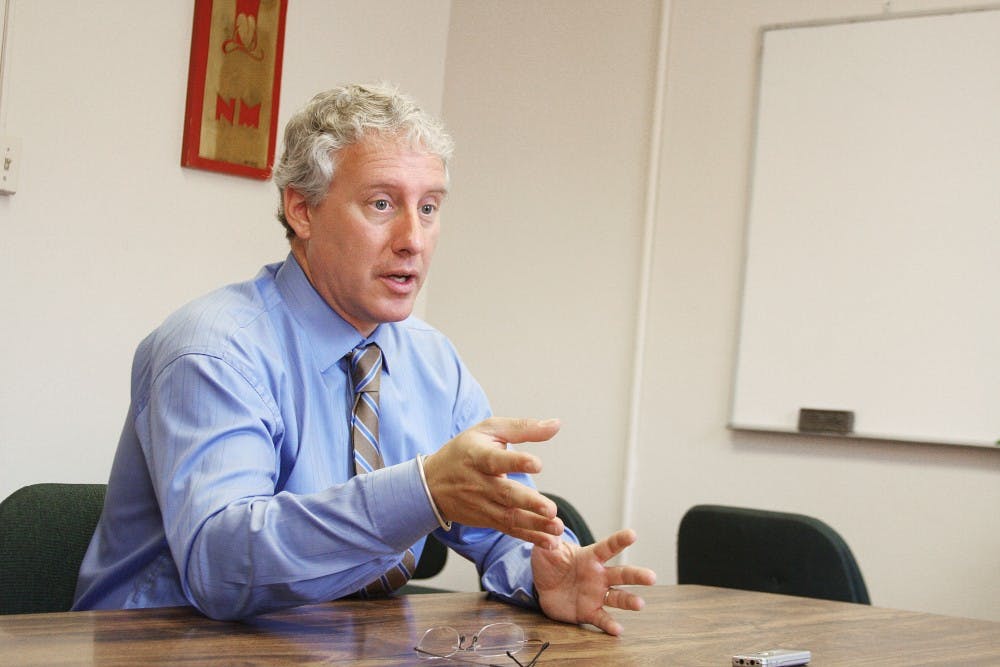David Brancaccio is host of NOW, a weekly news and analysis program that airs on PBS. In April, Brancaccio and his team were awarded the 2009 Walter Cronkite Award for Excellence in Television Political Coverage. Brancaccio has appeared on CNBC, on CNN with Anderson Cooper, and on MSNBC with Rachel Maddow. He has a bachelor of arts degree in history and African studies from Wesleyan and a master’s degree in journalism from Stanford.
Daily Lobo: Before you started on NOW on PBS, you had the opportunity to work with Bill Moyers. How did that influence you as a journalist?
David Brancaccio: He is a truly legendary figure in our business and an incredible guy. I co-anchored with him for almost two years — incredible experience. There is a famous story that I saw I think in five different history books about President Johnson — the Civil Rights Act of 1964, signed by President Johnson. So when I saw the story for the fifth time, same anecdote, I went to Bill Moyers and said, “So Bill, who is the source on that story? Who was there when the president was in his quarters? So Bill just kind of smiled at me like, ‘Well, you know, the president was in his bed and had the covers pulled up to his nose the way he did.’ It was clear that Moyers was the source on this story … It was just a profound honor to be able to hang out with him and be the co-anchor. He then retired, and I inherited the show and moved it into a slightly different direction.
DL: What is your definition of journalism and how do you see that definition reflected in the current state of the news media?
DB: What is news is open to interpretation. But it’s not rocket science what is journalism. It is being a witness to events or history: seeing it and then writing it down, or talking about it, or shooting it on video or stills. It’s plowing through primary-source documents, spending loads of time getting to the bottom of the documentary trail. There’s probably a few other things, but a person who just takes other people’s journalism and then offers an opinion based on it, or spins it in a certain direction, they are performing an important duty. Bill O’Reilly actually used to be a reporter, but now he’s sort of this person who comments on the world but doesn’t see it himself. People are entitled to their own opinions, but they are not entitled to their own facts. And what’s horrible is journalism has lost sight of this sometimes. Sometimes people are spinning out opinions not based on facts, masquerading as journalists, but the public doesn’t know the difference.
DL: How do you foresee the future of journalism?
DB: Journalism is probably at the bottom. I don’t think that democracy works without journalism; I think we’re a crucial part of it and it will all rattle apart if we don’t come up with a solution. Here is a rowdy quote from Billy Moyers: “News is reporting what they don’t want you to know. Everything else is just PR.” Moving into the future, everybody is going to have to know video, how to shoot stills, how to write, how to plow through information and decide what is good information and what is lame. Newspapers and news media will become more multimedia and they will start charging more for their stuff. But I don’t think journalism is dead yet.
DL: What advice do you have for current journalism students?
DB: Don’t get too depressed with the fact that newspapers are going under. It’s not a great time. But I will say this to people who have multimedia skills, who can critically think, and can write, and can do radio, TV and print: The old creeps running newsrooms are in awe of young people with multimedia skills. They think there is some sort of special secret alchemy that they bring, and that may lead them to hire you at a greater rate. They think they have the secret to crack this question of how do you make money to fund journalism. We got to have bright journalists or democracy fails.






